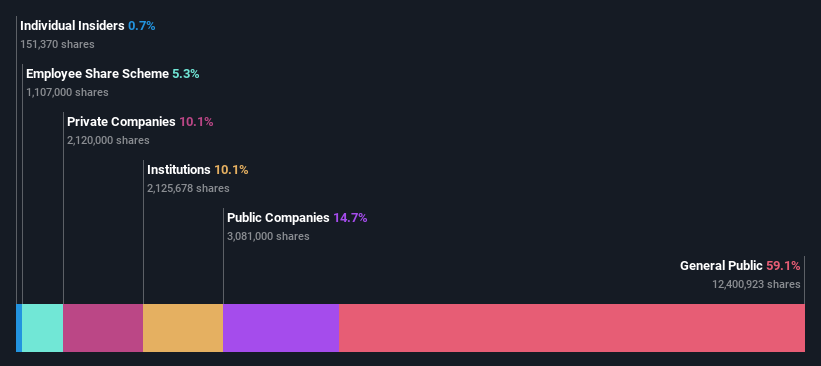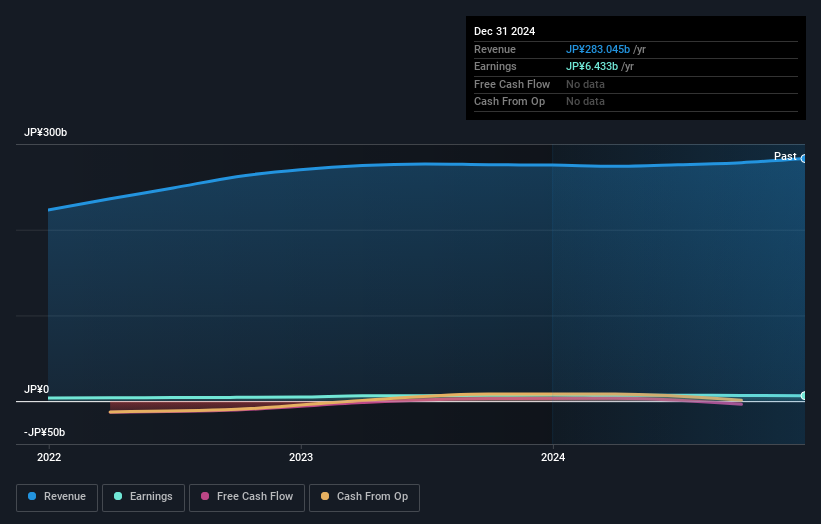- Japan
- /
- Trade Distributors
- /
- TSE:8065
Sato Shoji Corporation's (TSE:8065) stock price dropped 11% last week; retail investors would not be happy

Key Insights
- Significant control over Sato Shoji by retail investors implies that the general public has more power to influence management and governance-related decisions
- The top 25 shareholders own 41% of the company
- Institutions own 10% of Sato Shoji
A look at the shareholders of Sato Shoji Corporation (TSE:8065) can tell us which group is most powerful. With 59% stake, retail investors possess the maximum shares in the company. Put another way, the group faces the maximum upside potential (or downside risk).
And last week, retail investors endured the biggest losses as the stock fell by 11%.
Let's take a closer look to see what the different types of shareholders can tell us about Sato Shoji.
View our latest analysis for Sato Shoji

What Does The Institutional Ownership Tell Us About Sato Shoji?
Many institutions measure their performance against an index that approximates the local market. So they usually pay more attention to companies that are included in major indices.
We can see that Sato Shoji does have institutional investors; and they hold a good portion of the company's stock. This implies the analysts working for those institutions have looked at the stock and they like it. But just like anyone else, they could be wrong. If multiple institutions change their view on a stock at the same time, you could see the share price drop fast. It's therefore worth looking at Sato Shoji's earnings history below. Of course, the future is what really matters.

Sato Shoji is not owned by hedge funds. Our data shows that Mikami Kogyo K.K. is the largest shareholder with 7.6% of shares outstanding. In comparison, the second and third largest shareholders hold about 6.9% and 2.9% of the stock.
A deeper look at our ownership data shows that the top 25 shareholders collectively hold less than half of the register, suggesting a large group of small holders where no single shareholder has a majority.
While studying institutional ownership for a company can add value to your research, it is also a good practice to research analyst recommendations to get a deeper understand of a stock's expected performance. We're not picking up on any analyst coverage of the stock at the moment, so the company is unlikely to be widely held.
Insider Ownership Of Sato Shoji
While the precise definition of an insider can be subjective, almost everyone considers board members to be insiders. Management ultimately answers to the board. However, it is not uncommon for managers to be executive board members, especially if they are a founder or the CEO.
Insider ownership is positive when it signals leadership are thinking like the true owners of the company. However, high insider ownership can also give immense power to a small group within the company. This can be negative in some circumstances.
Our information suggests that Sato Shoji Corporation insiders own under 1% of the company. However, it's possible that insiders might have an indirect interest through a more complex structure. It has a market capitalization of just JP¥30b, and the board has only JP¥215m worth of shares in their own names. Many tend to prefer to see a board with bigger shareholdings. A good next step might be to take a look at this free summary of insider buying and selling.
General Public Ownership
The general public, who are usually individual investors, hold a substantial 59% stake in Sato Shoji, suggesting it is a fairly popular stock. This size of ownership gives investors from the general public some collective power. They can and probably do influence decisions on executive compensation, dividend policies and proposed business acquisitions.
Private Company Ownership
We can see that Private Companies own 10%, of the shares on issue. It's hard to draw any conclusions from this fact alone, so its worth looking into who owns those private companies. Sometimes insiders or other related parties have an interest in shares in a public company through a separate private company.
Public Company Ownership
It appears to us that public companies own 15% of Sato Shoji. It's hard to say for sure but this suggests they have entwined business interests. This might be a strategic stake, so it's worth watching this space for changes in ownership.
Next Steps:
I find it very interesting to look at who exactly owns a company. But to truly gain insight, we need to consider other information, too. Case in point: We've spotted 3 warning signs for Sato Shoji you should be aware of, and 1 of them is potentially serious.
Of course this may not be the best stock to buy. Therefore, you may wish to see our free collection of interesting prospects boasting favorable financials.
NB: Figures in this article are calculated using data from the last twelve months, which refer to the 12-month period ending on the last date of the month the financial statement is dated. This may not be consistent with full year annual report figures.
New: Manage All Your Stock Portfolios in One Place
We've created the ultimate portfolio companion for stock investors, and it's free.
• Connect an unlimited number of Portfolios and see your total in one currency
• Be alerted to new Warning Signs or Risks via email or mobile
• Track the Fair Value of your stocks
Have feedback on this article? Concerned about the content? Get in touch with us directly. Alternatively, email editorial-team (at) simplywallst.com.
This article by Simply Wall St is general in nature. We provide commentary based on historical data and analyst forecasts only using an unbiased methodology and our articles are not intended to be financial advice. It does not constitute a recommendation to buy or sell any stock, and does not take account of your objectives, or your financial situation. We aim to bring you long-term focused analysis driven by fundamental data. Note that our analysis may not factor in the latest price-sensitive company announcements or qualitative material. Simply Wall St has no position in any stocks mentioned.
About TSE:8065
Sato Shoji
Sells iron and steel products, non-ferrous metals, machines, electronic materials, industrial tools, lifestyle goods, precious metals and jewelry, construction materials, and environment-related goods in Japan.
Established dividend payer with mediocre balance sheet.
Market Insights
Community Narratives




